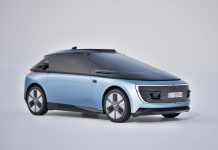NHTSA announced that it granted Nuro’s request for a temporary exemption from certain low-speed vehicle standard requirements. The exemption will allow the company to deploy its low-speed, occupantless electric delivery vehicle, the “R2.” Unlike a conventional low-speed vehicle, the R2 is designed to have no human occupant and operates exclusively using an automated driving system.
In comparison to Nuro’s previously deployed compliant vehicle, the R2 includes the same automated driving system, but would no longer include certain features that are unnecessary for an occupantless vehicle, including mirrors and a windshield. Nuro will be permitted to produce and deploy no more than 5,000 R2 vehicles during the two-year exemption period, and NHTSA will closely monitor Nuro’s operations during and after that time. Nuro intends to operate these vehicles as part of a local delivery service for restaurants, grocery stores, and other businesses.
Since the R2 is expected to rely on the same automated driving system as its earlier compliant vehicle, NHTSA believes this exemption will not lower the safety of the R2. Given the R2’s unique and novel design, though, NHTSA has determined that it would be in the public interest to maintain greater oversight of the R2 than typical for an exempt vehicle. The exemption has been conditioned on a set of terms including mandatory reporting of information about the operation of the R2 (including the automated driving system), and required outreach to the communities where the R2 will be deployed.











